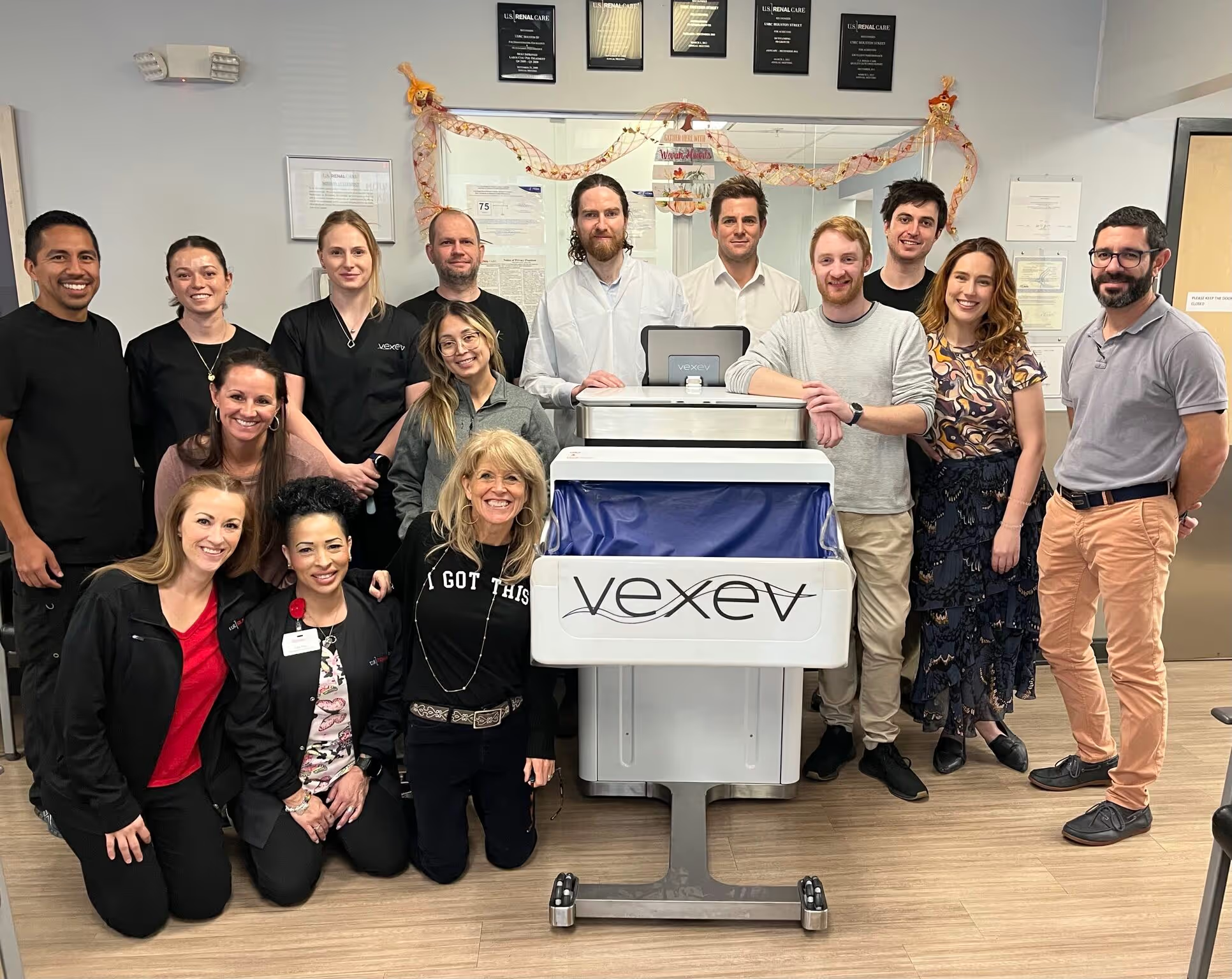Latest
Vexev completes enrollment in study of robotic ultrasound for AV fistula mapping
Vexev, an Australian-based medical device company advancing next-generation vascular imaging, and U.S. Renal Care, a leading provider of in-center and home dialysis in the United States, today announced the successful completion of enrollment in the CANSCAN clinical trial (NCT06691672). The first-of-its-kind, multi-center feasibility study enrolled 120 patients with chronic kidney disease to evaluate the use of semi-autonomous ultrasound scanning utilizing the VxWave Ultrasound Imaging System for arteriovenous (AV) fistula mapping in dialysis clinics.
The CANSCAN trial evaluates the VxWave ultrasound imaging system for arteriovenous (AV) fistula mapping in dialysis clinics. It enrolled 120 patients with chronic kidney disease to evaluate the semi-autonomous ultrasound platform. Vexev reached the enrollment milestone with leading U.S. dialysis provider U.S. Renal Care.
Dr. Varshi Broumand, an interventional nephrologist at South Texas Renal Care Group, serves as CANSCAN study principal investigator. Broumand said in a news release that the system could allow for vascular mapping within a dialysis facility. This could enable a more efficient way to obtain a permanent vascular access point. “The VxWave ultrasound system may remove one of the biggest hurdles in the creation of vascular access,” Broumand said. “Performing the ultrasound scans during the clinic visit would make AV fistula mapping more convenient and timely and potentially avoid sending patients to additional imaging appointments.”
Australia-based Vexev designed VxWave, a robotic tomographic ultrasound system, specifically for upper limb vascular imaging. It integrates advanced robotics, machine learning and ultrasound signal processing. This combination creates a 3D vascular model and detailed report to deliver insights into vascular access points at the point of care.
“Validating this concept is the first step toward a future where intelligent machines can perform high-precision medical imaging without a human hand on the probe,” said Dr. Shannon Thomas, MD, chief medical officer, Vexev. “The potential for a robotic system guided by AI, delivering real clinical value – it’s not science fiction anymore. The real excitement begins when this can change lives, not just lab results. This is a huge step forward in our mission to improve the lives of millions of people worldwide living with end-stage kidney disease.”
"U.S. Renal Care is committed to delivering innovative treatments that address the most critical needs for people living with kidney disease," said Geoffrey A. Block, MD, FASN, Associate Chief Medical Officer & Senior Vice President, Clinical Research & Medical Affairs, U.S. Renal Care. "The CANSCAN trial of the VxWave Ultrasound Imaging System opens the possibility of integrating semi-autonomous ultrasound imaging into our workflow and improving patient outcomes, by allowing patients to receive life-saving permanent vascular access placed in the optimal location, as quickly as possible."
The CANSCAN trial evaluates the VxWave ultrasound imaging system for arteriovenous (AV) fistula mapping in dialysis clinics. It enrolled 120 patients with chronic kidney disease to evaluate the semi-autonomous ultrasound platform. Vexev reached the enrollment milestone with leading U.S. dialysis provider U.S. Renal Care.
Dr. Varshi Broumand, an interventional nephrologist at South Texas Renal Care Group, serves as CANSCAN study principal investigator. Broumand said in a news release that the system could allow for vascular mapping within a dialysis facility. This could enable a more efficient way to obtain a permanent vascular access point. “The VxWave ultrasound system may remove one of the biggest hurdles in the creation of vascular access,” Broumand said. “Performing the ultrasound scans during the clinic visit would make AV fistula mapping more convenient and timely and potentially avoid sending patients to additional imaging appointments.”
Australia-based Vexev designed VxWave, a robotic tomographic ultrasound system, specifically for upper limb vascular imaging. It integrates advanced robotics, machine learning and ultrasound signal processing. This combination creates a 3D vascular model and detailed report to deliver insights into vascular access points at the point of care.
“Validating this concept is the first step toward a future where intelligent machines can perform high-precision medical imaging without a human hand on the probe,” said Dr. Shannon Thomas, MD, chief medical officer, Vexev. “The potential for a robotic system guided by AI, delivering real clinical value – it’s not science fiction anymore. The real excitement begins when this can change lives, not just lab results. This is a huge step forward in our mission to improve the lives of millions of people worldwide living with end-stage kidney disease.”
"U.S. Renal Care is committed to delivering innovative treatments that address the most critical needs for people living with kidney disease," said Geoffrey A. Block, MD, FASN, Associate Chief Medical Officer & Senior Vice President, Clinical Research & Medical Affairs, U.S. Renal Care. "The CANSCAN trial of the VxWave Ultrasound Imaging System opens the possibility of integrating semi-autonomous ultrasound imaging into our workflow and improving patient outcomes, by allowing patients to receive life-saving permanent vascular access placed in the optimal location, as quickly as possible."
Newsroom
Discover the latest news on our mission to revolutionise vascular imaging.




